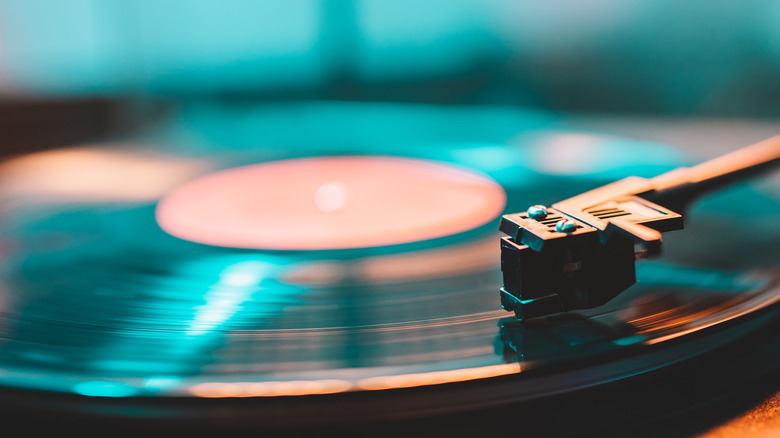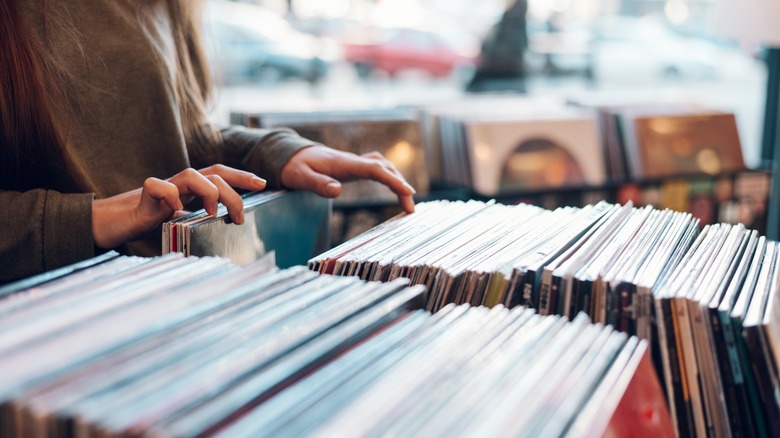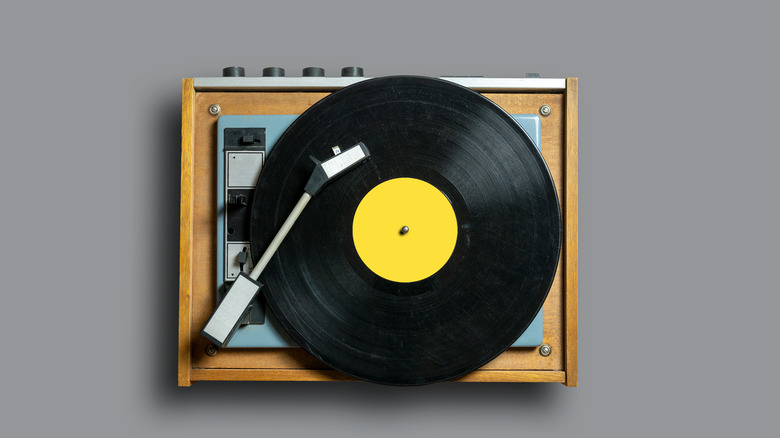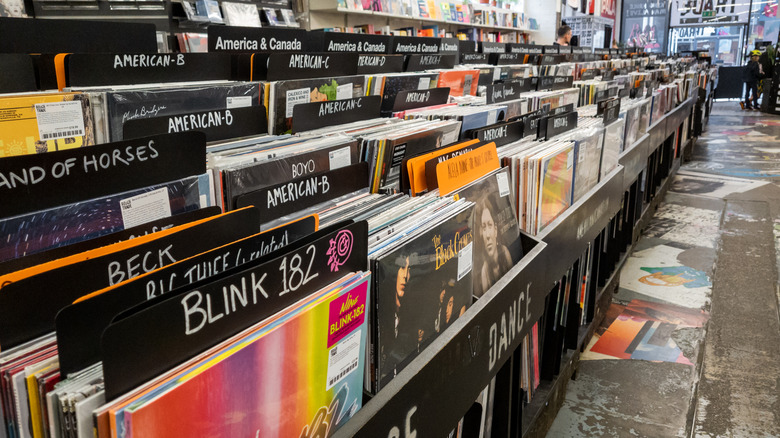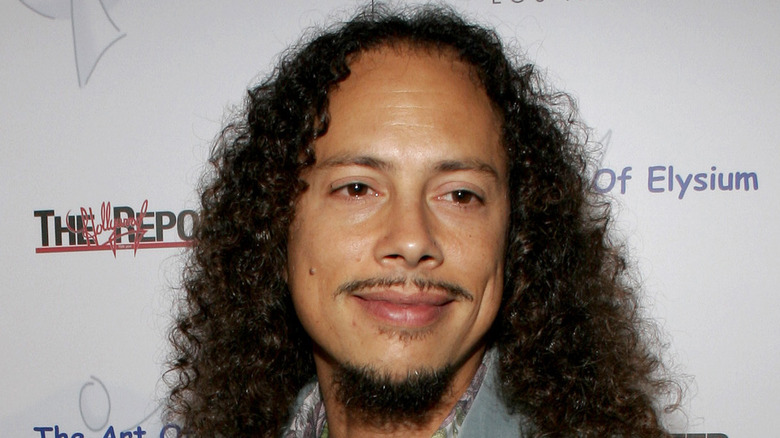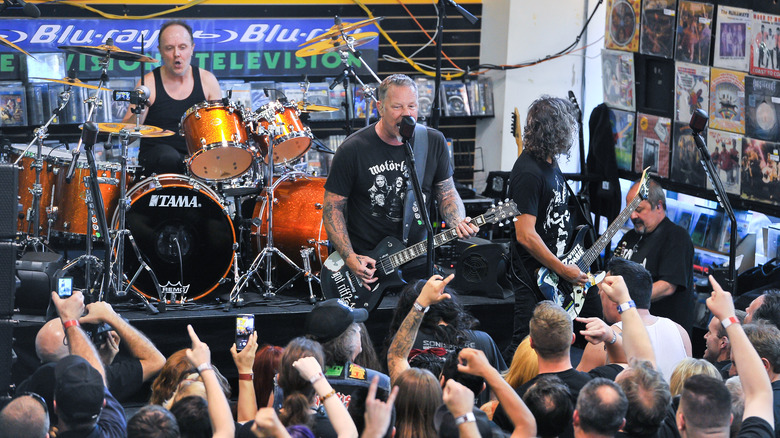Here's How Record Store Day Got Started
Record Store Day (RSD) is held each year in April to celebrate vinyl records and the small indie record shops that sell them. This year's celebration is being held on Sunday, April 23, according to the Record Store Day website.
You definitely know some of the RSD ambassadors of the last decade. Whether it's Iggy Pop, Jack White, Run the Jewels, or David Grohl, a well-known band or singer sponsors the event every year (via the Record Store Day website). After Brandie Carlisle headlined RSD in 2020, Fred Armisen took over as ambassador in 2021.
The event has grown substantially, from a grassroots effort to infuse the indie record industry with new interest, to a beloved international holiday. In fact, the 2022 RSD ambassador, or sponsor, is none other than pop superstar Taylor Swift (via the Record Store Day website). So what is Record Store Day all about — and how exactly did the holiday get its start?
Record store owners unite
The idea was born at a 2007 meeting of record store employees and owners, who began a discussion on how to celebrate indie record stores and drive customers into storefronts (via the Record Store Day website). And per Making Vinyl and Alt Press, the most well-known co-founders of Record Store Day are Michael Kurtz, president of The Department of Record Stores, and Chris Brown, a record store owner.
Fortune reports that Kurtz held a large meeting of record store owners in 2007. Brown, the owner of a record store chain called "Bull Moose" in the northeast, had a great idea — why not take the same approach to record stores that comic book stores do for Free Comic Book Day? He saw the influence that Free Comic Book Day had on small shops, who could rely on the annual holiday to bring in both new buyers and longtime collectors. And he believed it could be replicated to celebrate independent record stores, too.
Is vinyl dying out?
Following the meeting in Maryland, Brown sent an email to Kurtz, describing the details the members of the meeting had laid out (via Alt Press). He was dreaming big, and described a nationwide day to bring customers into small record shops en masse. Michael Kurtz had helped create the Music Monitor Network, which allowed him to get in contact with lots of indie stores to talk about the best ways to revive interest in their products (via VW Music). Kurtz was the right man for Brown to talk to: He had tons of connections in the music industry to make this dream a reality.
There were lots of reasons that Record Store Day was started. As Kurtz noted in an interview with Bozeman Magazine, the liquidation of Tower Records in 2006 gave the appearance that vinyl records were a dying medium (per the Hollywood Reporter via the Wayback Machine). But they believed they could reverse that trend.
A big musical party
He and other record store owners knew they had to plan something big to spin the media narrative around and create a positive experience for their customers. They basically wanted to create the biggest, most fun party ever, all centered around the love of vinyl records (via Bozeman Magazine).
Alt Press reports that when the founders were pitching ideas for the name, they first referred to it as "Indie Record Store Day." They hoped to build lots of hype for the day by involving game developers and celebrities, and creating excitement with TV, online, and print advertisements. They wanted to let the public know that indie records stores hadn't gone anywhere, and that it was more important than ever to support local small shops.
Per VW Music, vinyl records fell out of popularity in the 1990s through the 2000s. But as Kurtz claims, RSD brought a huge resurgence in love for records. In a time period after tape cassettes and CDs, when digital music streaming was just becoming popular, would people still want to collect old-fashioned vinyl records (via Muvi)?
Metallica headlines Record Store Day
On April 19, 2008, the first annual Record Store Day was celebrated across the U.S. (per Fortune). But they never could have done it without one band: Metallica (via VW Music). The band was essential to creating buzz around RSD. Metallica appeared at Rasputin Records in San Francisco, California, where they introduced the first RSD vinyl releases.
According to the Record Store Day website, thousands of fans showed up for the first annual Record Store Day event. The musicians spent the day chatting with fans and snapping photos. Customers then shopped the store for records to take advantage of discounted goods and unique RSD releases.
The reaction was exactly what the indie record community hoped for. People came out in droves, buying up 85,000 records during the first RSD (via VW Music). As Kurtz says, such high numbers of record sales were completely unexpected, and were a huge boost to small shops.
Impact on indie stores
Each record store celebrates a little differently, but lots of them hold additional events, like bringing in DJs to spin tunes, holding cookouts, hosting meet-and-greets with bands, and more (via the Record Store Day website). Not to mention the many limited-edition box sets and records that draw in fans and collectors. Some products are sold exclusively on RSD, so if you miss out, you may not get the chance to buy it again.
As it turns out, it seems that lots of people do love to purchase vinyl LPs and EPs, because the RSD resurgence now pumps $1 billion into record stores every year (via VW Music). And today, most people who now celebrate RSD are women under 26 years old — quite a young demographic.
Record Store Day has had a tangible impact on retailers. Per Alt Press, since the first annual event, RSD sales at indie stores have increased by at least 186%, with some stores expecting over 320% jump in sales on the holiday. You can also celebrate RSD no matter where you are — according to the Record Store Day website, it's held on every continent except Antarctica.
